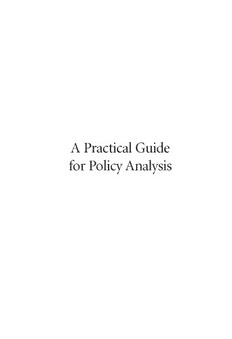
A Practical Guide for Policy Analysis: The Eightfold Path to More Effective Problem Solving PDF
Preview A Practical Guide for Policy Analysis: The Eightfold Path to More Effective Problem Solving
A Practical Guide for Policy Analysis iii A Practical Guide for Policy Analysis The Eightfold Path to More Effective Problem Solving Fourth Edition Eugene Bardach Richard and Rhoda Goldman School of Public Policy, University of California, Berkeley FOR INFORMATION: Copyright © 2012 by CQ Press, an Imprint of SAGE Publications, Inc. CQ Press is a registered trademark of Congressional Quarterly Inc. CQ Press An Imprint of SAGE Publications, Inc. 2455 Teller Road All rights reserved. No part of this book may be Thousand Oaks, California 91320 reproduced or utilized in any form or by any means, E-mail: [email protected] electronic or mechanical, including photocopying, recording, or by any information storage and retrieval SAGE Publications Ltd. system, without permission in writing from the publisher. 1 Oliver’s Yard 55 City Road London, EC1Y 1SP United Kingdom Printed in the United States of America SAGE Publications India Pvt. Ltd. B 1/I 1 Mohan Cooperative Industrial Area Bardach, Eugene. Mathura Road, New Delhi 110 044 India A practical guide for policy analysis : the eightfold path to more effective problem solving / Eugene Bardach. — 4th ed. SAGE Publications Asia-Pacific Pte. Ltd. 33 Pekin Street #02-01 p. cm. Far East Square Includes bibliographical references and index. Singapore 048763 ISBN 978-1-60871-842-9 (pbk.: alk. paper) 1. Policy sciences. 2. Decision making. 3. Problem solving. I. Title. Acquisitions Editor: Charisse Kiino Production Editor: Mirna Araklian H97.B37 2011 Copy Editor: Amy Marks 320.6—dc23 2011032521 Typesetter: C&M Digitals (P) Ltd. Proofreader: Stefanie Storholt Library of Congress Cataloging-in-Publication Data Indexer: Marilyn Augst, Prairie Moon Indexing Cover Designer: Catherine Anderson and Anne C. Kerns, This book is printed on acid-free paper. Anne Likes Red, Inc. Marketing Manager: Chris O’Brien 12 13 14 15 16 10 9 8 7 6 5 4 3 2 1 ABOUT THE AUTHOR E ugene Bardach has been teaching graduate-level policy analysis work- shop classes since 1973 at the Goldman School of Public Policy, University of California, Berkeley, in which time he has coached some 400 projects. He is a broadly based political scientist with wide-ranging teaching and research interests. His focus is primarily on policy imple- mentation and public management, and most recently on problems of facilitating better interorganizational collaboration in service delivery (e.g., in human services, environmental enforcement, fire prevention, and habitat preservation). He also maintains an interest in problems of homeland defense regulatory program design and execution, particularly in areas of health, safety, consumer protection, and equal opportunity. Bardach has developed novel teaching methods and materials at Berkeley, has directed and taught in residentially based training programs for higher-level public managers, and has worked for the Office of Policy Analysis at the U.S. Department of Interior. He is the recipient of the 1998 Donald T. Campbell Award of the Policy Studies Organization for creative contribution to the methodology of policy analysis. This book is based on his experience teaching students the principles of policy analy- sis and then helping them to execute their project work. v CONTENTS PREFACE xi ACKNOWLEDGMENTS xiii INTRODUCTION xv PART I THE EIGHTFOLD PATH 1 Step One: Define the Problem 1 Step Two: Assemble Some Evidence 11 Step Three: Construct the Alternatives 16 Step Four: Select the Criteria 31 Step Five: Project the Outcomes 47 Step Six: Confront the Trade-Offs 63 Step Seven: Decide! 69 Step Eight: Tell Your Story 70 PART II ASSEMBLING EVIDENCE 79 Getting Started 80 Locating Relevant Sources 82 Gaining Access and Engaging Assistance 89 Conducting a Policy Research Interview 94 vii viii contents Using Language to Characterize and Calibrate 103 Protecting Credibility 104 Strategic Dilemmas of Policy Research 106 PART III “SMART (BEST) PRACTICES” RESEARCH: UNDERSTANDING AND MAKING USE OF WHAT LOOK LIKE GOOD IDEAS FROM SOMEWHERE ELSE 109 Develop Realistic Expectations 109 Analyze Smart Practices 110 Observe the Practice 115 Describe Generic Vulnerabilities 119 But Will It Work Here? 120 Back to the Eightfold Path 123 APPENDIX A SPECIMEN OF A REAL-WORLD POLICY ANALYSIS 125 Preface 125 Summary 126 APPENDIX B THINGS GOVERNMENTS DO 141 Taxes 141 Regulation 142 Subsidies and Grants 143 Service Provision 144 Agency Budgets 145 Information 145 The Structure of Private Rights 146 The Framework of Economic Activity 147 Education and Consultation 148 Financing and Contracting 148 Bureaucratic And Political Reforms 149 contents ix APPENDIX C UNDERSTANDING PUBLIC AND NONPROFIT INSTITUTIONS: ASKING THE RIGHT QUESTIONS 151 Mission 151 Environment 151 Performance Measurement 152 Technology 153 Production/Delivery Processes 154 Front-Line Workers and Co-Producers 155 Partners and Other Outsiders 155 Centralization/Decentralization 156 Culture and Communications 156 Politics 156 Leadership 156 Change 157 APPENDIX D STRATEGIC ADVICE ON THE DYNAMICS OF GATHERING POLITICAL SUPPORT 159 REFERENCES 167 INDEX 171
